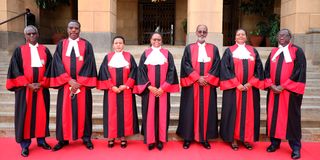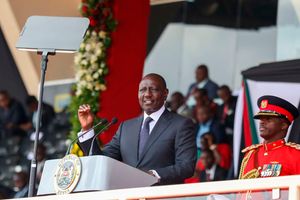Premium
SRC wants case on judges' car grants heard by expanded bench

From Left: Supreme Court Judges Isaac Lenaola, Dr Smokin Wanjala, Deputy Chief Justice and Vice President of the Supreme Court Philomena Mwilu, Chief Justice and President of the Supreme Court Martha Koome, Mohamed Ibrahim, Njoki Ndung'u and William Ouko in this file photo.
What you need to know:
- In a constitutional petition filed by a Mr Peter Mwangi Gachuiri, he seeks to reinstate the taxable car allowances for High Court, Court of Appeal and Supreme Court judges, which they have enjoyed since 2011, but which the SRC scrapped in 2021.
- SRC argues that judges have official chauffeured round-the-clock transport, fully serviced by the State and that giving them car grants amounts to double remuneration.
The Salaries and Remuneration Commission (SRC) has kicked off its court fight with the Judiciary over car grants for judges, with a push to have an expanded bench hear the petition.
The SRC said the matter raises substantial questions of law, which are weighty and complex, and should therefore be heard by a bench of an uneven number.
At the centre of the dispute is Sh10 million each High Court judge has been enjoying as taxable car allowance, to buy a car of his choice, which is replaced every four years.
In a constitutional petition filed by a Mr Peter Mwangi Gachuiri, he seeks to reinstate the taxable car allowances for High Court, Court of Appeal and Supreme Court judges, which they have enjoyed since 2011, but which the SRC scrapped in 2021.
The SRC, through lawyer Peter Wanyama, filed an application seeking that the matter be referred Chief Justice Martha Koome to constitute a three-judge bench to hear the petition.
Mr Wanyama told Justice Lawrence Mugambi that the petition is of great public interest as it concerns the use of public funds, and the determination will have a significant bearing on the fiscal sustainability of the national wage bill.
The SRC has raised five issues for determination by the expanded bench, including whether the Head of Public Service can usurp the constitutional mandate of the SRC as provided for under Article 230 of the Constitution and purport to confer remuneration benefits.
The salaries commission wants the bench to determine whether the scrapping of the taxable car allowance affects the independence of the Judiciary within the meaning of Article 160 (4) of the Constitution.
SRC is also seeking the bench to rule whether judges' car grants, which will cost taxpayers about Sh9.8 billion every four years, are fiscally sustainable and affordable considering the country's national wage bill.
According to court documents seen by the Nation, the SRC has been sued alongside the Attorney General while the JSC and Kenya Judges Welfare Association are enjoined as interested parties.
Both the Judicial Service Commission and the Kenya Judges Welfare Association have already filed their submissions in court in support of the case.
Lawyers for other parties in the case -- including the petitioner, the Judicial Service Commission (JSC) and the Attorney General -- said they were not opposed to SRC’s application to have the Chief Justice constitute a three-judge bench.
Mr Zebedeo Ongoya for Mr Gachuiri told the court that the weighty questions of law raised by the salaries commission were a stamp of approval that the petition wasn't frivolous.
Drama over ruling
The court session had its own drama after Justice Mugambi announced he will rule on whether to refer the matter to the Chief Justice or not on November 9, with Mr Wanyama pointing out that the judge was quick to hear the matter because it concerns the Judiciary.
"Your honour, I am surprised you've given a date too soon yet just yesterday I was before you pleading to be heard on another matter but you flatly indicated your diary was full until next year" Mr Wanyama told Justice Mugambi.
The defence lawyer said the salaries commission will be raising the conflict of interest involving all judges in Kenya and that the November 9 date was raising eyebrows over the court's impartiality.
Justice Mugambi stood his ground saying the decision will be emailed to all parties on November 9.
SRC argues that judges have official chauffeured round the clock transport, fully serviced by the State and that giving them car grants amounts to double remuneration.
Under the current terms, it will cost taxpayers Sh9.8 billion every four years to fund car allowances for judges, which according to the SRC is unaffordable and unsustainable.
SRC argues that in the event of a decision that benefits the judges, taxpayers will have no recourse and this would be seen as abuse of judicial authority.
The commission wants the suit thrown out on the basis of conflict of interest.
“The matter before court is of interest to every judge as a decision in favour of the petitioner would directly benefit all the judges. This puts the judges in a position of direct conflict in a matter before them,” SRC says in replying affidavit.
Through its chief executive Anne Gitau, SRC further says that the Chief Justice -- who in addition to chairing the Judicial Service Commission heads the judiciary and the Supreme Court -- has already pronounced herself on the matter, hence raising concerns on the impartiality of judges in determining the matter.
But the petitioner claims that the car grant is a facility that judges have historically benefitted and serving judges, both under the old and the new Constitution, have a legitimate expectation to that benefit.
He argues that by scrapping the taxable car allowance on the ground that it was not set and reviewed by the commission, SRC directly contravened Article 160 (4) of the Constitution, which prohibits the variation of the remuneration and benefits to the disadvantage of judges.
Mr Gachuiri claims SRC’s action to vary remuneration of a judge amounts to interfering with the independence of the Judiciary.
The Judges Welfare Association, through its president Kossy Bor, in its submission says in scrapping the car grant, the SRC had failed to ensure Judiciary attracts and retains competent personnel.
“As part of their benefits upon their appointment, judges are entitled to a number of benefits including a car grant for purchase of a motor vehicle for personal use,” Ms Bor says in the replying affidavit.





